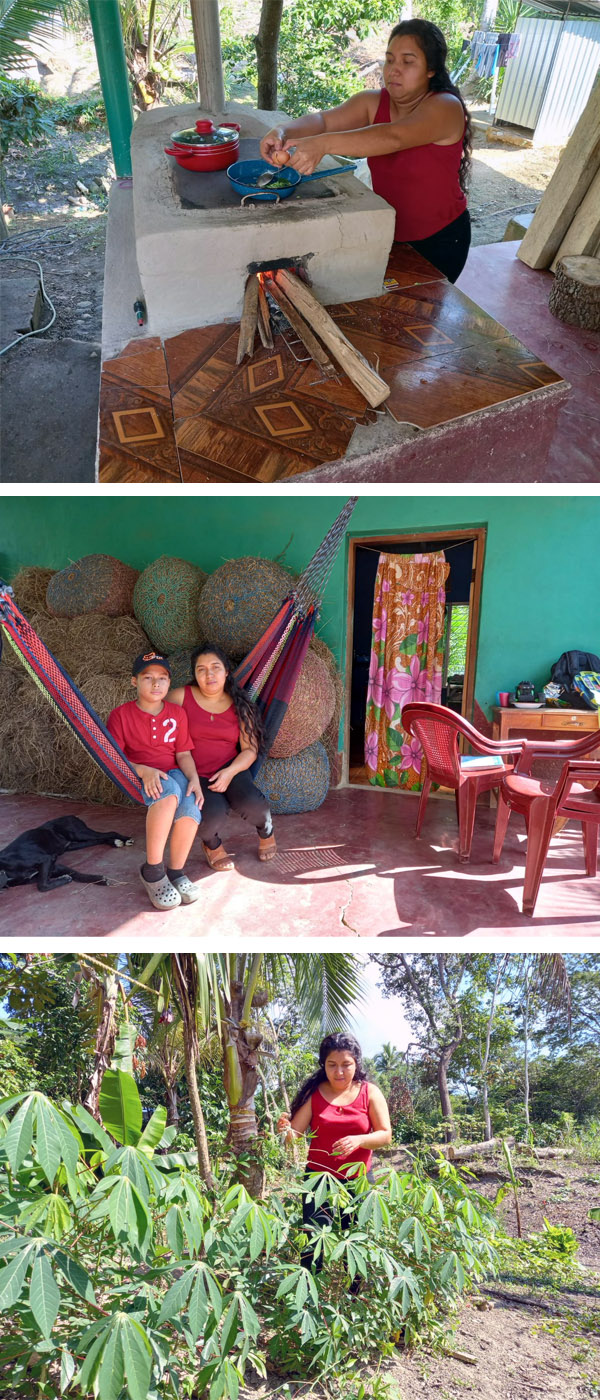Stories of Change

Top: Esmerelda cooking on her eco stove. Middle: Esmerelda and her 8-year-old son Diego in front of their house. Bottom: Esmerelda harvesting yucca.
From Stoves to Gardens to Water to Livestock, Esmerelda’s Family is Thriving
Preparing chicken soup with basil, oregano and green bananas or the fried fish that her son and husband like is now so much easier for 27-year-old Esmerelda Robles. Today she uses less firewood, cooks food faster and saves time preparing meals in her kitchen.
Before, her house was covered in soot (hollín), a black, very fine and greasy substance that forms from smoke and sticks to surfaces. “Before, I had a permanent cough,” Esmerelda says. “Now, with just a load of firewood, you cook, you don’t need much (unlike the stove we had before), and it is very helpful for our lungs that there is no smoke.”
This is one of the advantages of the eco-stove that she and 58 other families have installed in their homes to prepare meals without increasing environmental pollution. The most important contribution of eco-stoves, however, is the significant reduction in the use of firewood. This is one part of a CWS program to improve food security and adapt to climate change. Our local partner who developed the program is CASM (or, in English, Mennonite Social Action Commission).
This program is unfolding in Macuelizo, Nueva Frontera and Azacualpa, all of which are in the department of Santa Bárbara, Honduras. In total, 500 families from rural areas with limited economic resources participate in different parts of the program.
Esmeralda lives in Vainillas, in Macuelizo. The weather is warm, but the mornings are often chilly. In her community, there are about 50 houses located near a pine forest and large tamarind and mango trees. After traveling several highways and paths, you can see the green house where Esmeralda lives with her husband Rigoberto and her son Diego. Esmerelda calls Vainillas, “a beautiful place with friendly people, with good coexistence. We all know each other because we have always been there. I was born and raised here.”
Through a “pass chain” activity in the program, Esmeralda received several foster animals. This activity consists of a family receiving a pregnant pig, sheep or cow and feeding and caring for it. When the next piglet, lamb or calf is born, it is passed on to another family, which in turn will do the same. Today, Esmeralda has a pregnant sow, three sheep and 30 chickens.
Other CWS-supported initiatives in the community where Esmeralda lives include the installation of pipes for the drinking water (previously, families had limited access to water) cultivating tilapia and raising cows, sheep and chickens.
Esmeralda has participated in training sessions about planting crops and producing fertilizers, received seeds and nowadays produces most of the food that her family eats like ripe plantain, cushaw pumpkin (ayote), chili peppers and yucca. In addition to feeding her family, she sells her produce or exchanges it with neighbors. She and her family also learned about food and nutrition, hygiene, waste management and environmental protection.
When we talked to Esmerelda in late 2021, she was planning for Christmas. Her family was going to prepare tamales with meat (it is a traditional meal that has a corn base and a filling of vegetables, potatoes and pork, served wrapped in banana or plantain leaves). “Here, we always spend the holidays as a family,” she says. “We go to church–we are Catholic–so we go there and then we come together to share a dinner.”
The next project at Esmeralda’s house is to get a biodigester to make better use of decomposing organic matter waste (such as animal excrement) and produce methane gas. “A dream we have as a family is to have a micro-business or a sale and production of meat. The first thing we are going to do is buy the freezer,” says Esmeralda and adds that with the money they get, they plan to expand the house, which today has two rooms.
(Note: In this program in Macuelizo, everyone has already received two doses of the COVID-19 vaccine. Masking and common handwashing are standard. We would also like to thank Growing Hope Globally for their support of this program.)
